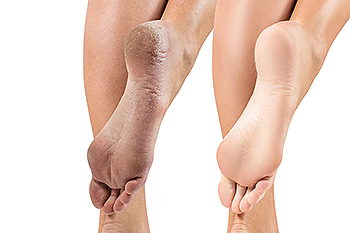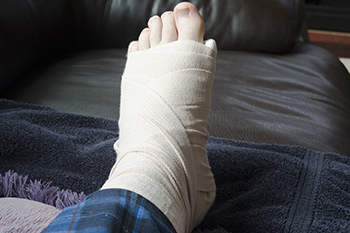Items filtered by date: July 2022
Cracking Down on Cracked Heels

Dried out skin on the heels can crack when weight is placed on them and the fat pad in the heels spread. This is a condition known as cracked heels. Cracked heels can vary in severity from mild to severe. Left untreated, some cracked heels can deepen and worsen to the point of pain, bleeding, and even infection. A person is more prone to developing cracked heels if they do not take care of cleaning and moisturizing their heels, if they stand for excessive amounts of time, wear open-back shoes, or walk barefoot frequently. Being overweight can be a contributing factor to the formation of cracked heels, as can certain medical conditions that dry out skin. Certain water-retaining creams applied nightly can sometimes help avoid cracked heels from developing. If you have cracked heels that are not responding to at-home treatment, or you have diabetes and cannot treat them by yourself, it is suggested you contact a podiatrist.
If the skin on your feet starts to crack, you may want to see a podiatrist to find treatment. If you have any concerns, contact Deborah Rosenfeld from Rosenfeld Podiatry. Our doctor can provide the care you need to keep you pain-free and on your feet.
Cracked Heels
It is important to moisturize your cracked heels in order to prevent pain, bleeding, and infection. The reason cracked heels form is because the skin on the foot is too dry to support the immense pressure placed on them. When the foot expands, the dry skin on the foot begins to split.
Ways to Help Heal Them
- Invest in a good foot cream
- Try Using Petroleum Jelly
- Ease up on Soaps
- Drink Plenty of Water
Ways to Prevent Cracked Heels
- Moisturize After Showering
- Skip a Shower
- Keep Shower Water Lukewarm
- Don’t Scrub Your Feet
If you are unsure how to proceed in treating cracked heels, seek guidance from a podiatrist. Your doctor will help you with any questions or information you may need.
If you have any questions, please feel free to contact our office located in Marlton, NJ . We offer the newest diagnostic and treatment technologies for all your foot care needs.
The Link Between Obesity and Foot Pain

Just like any other medical disease or condition, foot pain is associated with several risk factors. This is to say that carrying a certain attribute makes one more likely to suffer from foot pain. For instance, pregnant women and arthritic individuals are at a higher risk of experiencing foot pain. One often overlooked high risk group is obese individuals. Once one’s body mass index has increased, the incidence of plantar heel pain increased. Likewise, fat mass is positively correlated with foot pain. Obese individuals are also more likely to have flat feet as well. This is likely the case because obese people place more weight and force down onto their feet, pushing down any natural arch so that the entire foot lays flush against the ground. If you are obese, you can reach out to a podiatrist to assist you with any foot pain you might have.
Obesity has become very problematic at this point in time and can have extremely negative effects on the feet. If you’re an obese individual and are concerned about your feet, contact Deborah Rosenfeld from Rosenfeld Podiatry. Our doctor can provide the care you need to keep you pain-free and on your feet.
Obesity and Your Feet
Since your feet are what support your entire weight when standing, any additional weight can result in pain and swelling. Being overweight is one of the main contributors to foot complications.
Problems & Complications
Extra Weight – Even putting on just a few extra pounds could create serious complications for your feet. As your weight increases, your balance and body will shift, creating new stresses on your feet. This uneven weight distribution can cause pain, even while doing the simplest tasks, such as walking.
Diabetes – People who are overweight are at serious risk of developing type-2 diabetes, which has a drastic impact on the health of your feet. As you get older, your diabetes might worsen, which could lead to loss of feeling in your feet, sores, and bruises. You could also become more prone to various infections.
Plantar fasciitis – Pressure and stress that is placed on muscles, joints, and tendons can trigger plantar fasciitis, which is an inflammation of tissue that forms along the bottom of the foot.
If you have any questions please feel free to contact our office located in Marlton, NJ . We offer the newest diagnostic and treatment technologies for all your foot and ankle needs.
Protecting Your Feet While on the Clock

Many individuals in the workforce must spend the vast majority of their shift standing on their feet. For example, by nature of their jobs, food servers, hairdressers, retail workers, and others must be on their feet throughout most of the day. This can put these workers at a greater risk of experiencing foot pain and developing bothersome foot conditions. However, if you are one such worker that spends the majority of your day on your feet, there are a number of steps you can take to mitigate any stress or pressure you are exerting on your feet. First, you can be diligent about selecting the right pair of work shoes. Look for shoes or work boots that provide extra support and cushioning, particularly for the arches, ankles, and joints. Additionally, you might also try to find a pair of supportive work socks with a large density of cotton content. This can provide extra support to the insoles of your feet. Lastly, to ensure that you are taking care of your feet while on the clock, you might consider taking twenty minutes or so after every shift to roll out your feet with a cool water bottle. Using this foot care technique will increase blood flow and circulation throughout the foot and reduce any tension in your foot muscles. See a podiatrist for more tips about how you can protect your feet throughout the work day.
While working on the feet, it is important to take the proper care of them. For more information about working on your feet, contact Deborah Rosenfeld from Rosenfeld Podiatry. Our doctor will treat your foot and ankle needs.
Working on Your Feet
Standing on your feet for long periods of time can cause stress and pain in your feet. Your whole body may experience change in terms of posture, back pain, bunions, callouses and or plantar warts. There are ways to avoid these conditions with proper foot care, smart choices and correct posture.
Positive Changes
Negative heeled shoe – Choosing this shoe type places the heel slightly lower than the ball of the foot. These are great for overall foot health. Find shoes that fit you correctly.
Go barefoot – Our feet were not designed to be enclosed for all hours of the day. Try to periodically expose your feet to air.
Eliminate Pain
Foot Exercises – Performing simple exercises, incorporating yoga and doing stretches are beneficial. This will allow increased blood flow to the area and muscles of the foot.
Achilles tendon – Stretching the foot out flat on the floor will relax the calf muscles and tendon. These exercises can be performed almost anywhere. Make sure you add these exercises to your daily regimen.
With a little bit of this information and knowing more about foot health, you will notice changes. Foot stretches and proper footwear will help with pain and prevent further issues.
If you have any questions please feel free to contact our office located in Marlton, NJ . We offer the newest diagnostic and treatment technologies for all your foot and ankle needs.
Heel Pain in the Morning?
Foot Stress Fractures

A stress fracture in the foot is a small crack or break in a bone. This type of fracture is also known as a hairline fracture. Stress fractures most often happen in weight-bearing bones among people who participate in repetitive activities that put a lot of stress on the feet. They are also due to a sudden change in activities or surfaces, or an abnormal foot structure. Those most at risk for stress fractures are women, those with low levels of vitamin D and calcium, those with osteoporosis, those taking certain medications, and those who have previously sustained foot stress fractures. Stress fractures can occur in any bone of the foot but most often happen to the second and third metatarsal bones – the long bones that connect the toes to the ankle. These are the bones that bear the most stress when pushing off the foot. A stress fracture must heal properly to prevent worse injuries from occurring. Stress fractures of the foot cause pain, which gets worse when walking or bearing weight. The pain may ease when resting and return when activity commences. Stress fractures can be prevented by warming up before participating in activities that put stress on the feet, cross-training rather than focusing on a single sport, wearing properly fitted shoes for the activity, eating a healthy diet (with enough vitamin D and calcium), and checking in with doctors about possible side effects of medicines they are taking. If you feel you have a foot stress fracture, you might see a podiatrist for proper diagnosis and treatment as soon as possible.
Activities where too much pressure is put on the feet can cause stress fractures. To learn more, contact Deborah Rosenfeld from Rosenfeld Podiatry. Our doctor can provide the care you need to keep your pain free and on your feet.
Dealing with Stress Fractures of the Foot and Ankle
Stress fractures occur in the foot and ankle when muscles in these areas weaken from too much or too little use. The feet and ankles then lose support when walking or running from the impact of the ground. Since there is no protection, the bones receive the full impact of each step. Stress on the feet can cause cracks to form in the bones, thus creating stress fractures.
What Are Stress Fractures?
Stress fractures occur frequently in individuals whose daily activities cause great impact on the feet and ankles. Stress factors are most common among:
- Runners
- People affected with Osteoporosis
- Tennis or basketball players
- Gymnasts
- High impact workouts
Symptoms
Pain from the fractures occur in the area of the fractures and can be constant or intermittent. It will often cause sharp or dull pain with swelling and tenderness. Engaging in any kind of activity which involves high impact will aggravate pain.
If you have any questions please feel free to contact our office located in Marlton, NJ . We offer the newest diagnostic and treatment technologies for all your foot and ankle needs.


